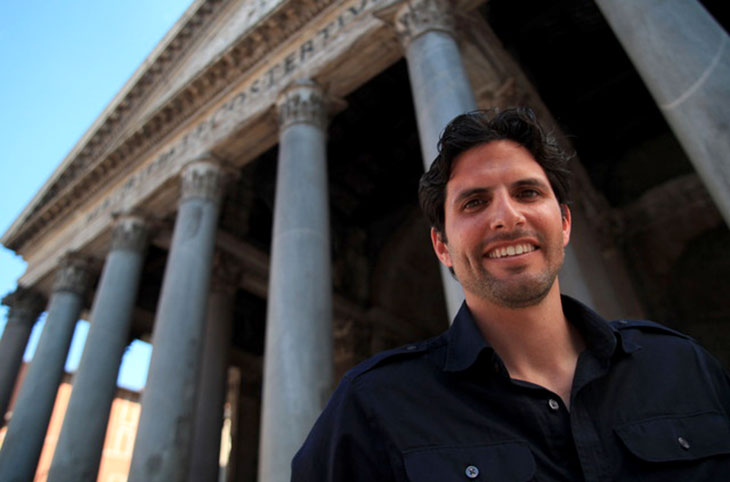Darius Arya

Editor’s note: Since this profile was published, Arya has continued to explore the ancient world. In the fall of 2018, he will host a new PBS series “Ancient Invisible Cities.”
As executive director of the American Institute for Roman Culture (AIRC), Darius Arya ’89 “digs” history.
Based in Rome, Arya is a passionate advocate for all things related to Roman history; the archaeologist and classics scholar eagerly shares his enthusiasm with others on a near daily basis, tweeting, blogging and hosting online videos. He is about to launch a new, multi-platform online course, “Ancient Rome, Live” that will include an app, five hours of video, an ebook, and an interactive website.
“We’re trying to think outside the box,” Arya says. “We want to take narrow, academic discussions about Roman culture and put them in context with larger contemporary issues. We want people to be inspired by Rome as more than a place to enjoy during vacation.”
Arya’s interest in the classics started in middle school in West Virginia and informed his entire education. At Exeter, he earned a classics diploma. While pursuing his undergraduate degree at the University of Pennsylvania, he studied in Rome and realized, as he puts it, “I needed to be there.” He received a master’s degree and a doctorate from the University of Texas at Austin; a Fulbright scholarship and fellowship from the American Academy of Rome enabled him to return to Italy, this time permanently. He established AIRC in 2002, with a mission to educate others about the importance of historical preservation in Italy. The organization offers study-abroad programs, an excavation field school and online education via videos and blogs.
Arya’s extensive use of social media and video sets him apart from many of his academic peers. He uses Facebook, Twitter, Instagram and YouTube, as well as video blogs, to facilitate conversations about cultural heritage. His personable film presence is evident in such productions as Living History, a video blog for The Huffington Post documenting efforts to save the famed Roman Colosseum; short online videos about AIRC programs and archaeological digs; and Digging History, a Kickstarter-funded documentary series about Rome. He’s often an on-air expert in documentaries for the Discovery, History and National Geographic television channels, and has been interviewed by major media outlets around the world.
“I’ve had a longtime interest in video production and social media,” Arya says. “It’s a great way to communicate and to help with fundraising for AIRC. We have a good share of the preservation conversation that larger, more established organizations don’t.”
Arya and AIRC have put themselves squarely in the middle of key Roman preservation projects. One of the largest is a 250-acre archeological site at Ostia Antica, the 2,700-year-old ancient port of Rome, recently deter- mined to be larger than Pompeii. For the past three years, students and adults at AIRC’s field school have worked in the Parco dei Ravennati, a park just outside the walls of Ostia. In April, they uncovered a cemetery where it’s believed the variety of tombs found reflects Ostia Antica’s once-bustling, multicultural population.
“Ostia is one of the top five archaeological sites in the world to understand the daily life of ancient Rome,” Arya says. “It needs more conservation management and this is a good opportunity to focus attention on the site.”
Arya has also launched online petitions to save important Italian heritage projects such as Hadrian’s Villa and the Gladiator Tomb, popularized in the movie Gladiator. When he isn’t filming, digging, raising money, speaking or blogging about Italian archaeological projects and preservation issues, Arya meets with politicians, policy makers, and business leaders, discussing how history and preservation can be applied to real-world situations. Arya believes history offers important lessons for leaders today. “The classics inspire people,” he says. “There are many business leaders, like Facebook founder Mark Zuckerberg [’02], who are enamored with history and motivated by it. It’s a discipline with far-reaching implications because it allows students to learn and really engages their minds.”
—By Debbie Kane